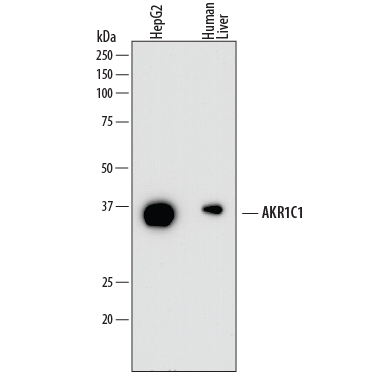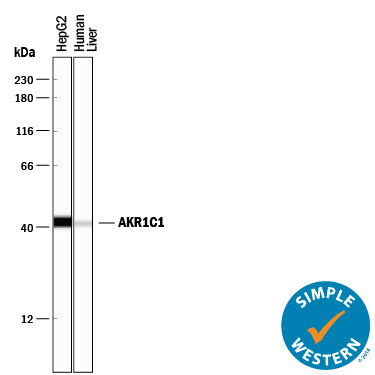Human Aldo-keto Reductase 1C1/AKR1C1 Antibody
Human Aldo-keto Reductase 1C1/AKR1C1 Antibody Summary
Met1-Tyr323
Accession # Q04828
Applications
Please Note: Optimal dilutions should be determined by each laboratory for each application. General Protocols are available in the Technical Information section on our website.
Scientific Data
 View Larger
View Larger
Detection of Human Aldo‑keto Reductase 1C1/AKR1C1 by Western Blot. Western blot shows lysates of HepG2 human hepatocellular carcinoma cell line and human liver tissue. PVDF membrane was probed with 0.1 µg/mL of Mouse Anti-Human Aldo-keto Reductase 1C1/AKR1C1 Monoclonal Antibody (Catalog # MAB6529) followed by HRP-conjugated Anti-Mouse IgG Secondary Antibody (Catalog # HAF007). A specific band was detected for Aldo-keto Reductase 1C1/AKR1C1 at approximately 37 kDa (as indicated). This experiment was conducted under reducing conditions and using Immunoblot Buffer Group 1.
 View Larger
View Larger
Detection of Human Aldo‑keto Reductase 1C1/AKR1C1 by Simple WesternTM. Simple Western lane view shows lysates of HepG2 human hepatocellular carcinoma cell line and human liver tissue, loaded at 0.5 mg/mL. A specific band was detected for Aldo‑keto Reductase 1C1/AKR1C1 at approximately 41 kDa (as indicated) using 1 µg/mL of Mouse Anti-Human Aldo‑keto Reductase 1C1/AKR1C1 Monoclonal Antibody (Catalog # MAB6529). This experiment was conducted under reducing conditions and using the 12-230 kDa separation system.
Reconstitution Calculator
Preparation and Storage
- 12 months from date of receipt, -20 to -70 °C as supplied.
- 1 month, 2 to 8 °C under sterile conditions after reconstitution.
- 6 months, -20 to -70 °C under sterile conditions after reconstitution.
Background: Aldo-keto Reductase 1C1/AKR1C1
AKR1C1 (20-alpha -hydroxysteroid dehydrogenase, 20‑ alpha ‑HSD) is a member of aldo-keto reductase (AKR) superfamily. AKRs perform the NAD(P)H-dependent reduction of carbonyl groups (1). Four AKR1C isoforms (AKR1C1-C4) are known to exist in humans. They are all highly expressed in the liver. Three isoforms, excluding AKR1C4, have a wider expression pattern including prostate, testes, uterus, mammary gland, and haemopoietic progenitors (2). These enzymes are able to accept various natural steroids as substrates, including 3-, 7-, and 20‑ketosteroids (3). They can also activate prodrugs such as synthetic steroid hormone tibolone by converting it into active 3 alpha / beta -hydroxy form (4). They are recognized as phase I drug-metabolizing enzymes involved in the maintenance of steroid homeostasis, prostaglandin metabolism, and metabolic activation of polycyclic aromatic hydrocarbons (5). Their reactions introduce a hydroxyl group into the product making it available for sulfonation and glucuronidation by phase II enzyme. Elevated expression of these enzymes is related to cancer with hormone-dependent malignancies (6, 7). Increased levels of expression of AKR1C1 parallels increased cell proliferation activity in human colon cancer cells. It has been shown to be associated with oncogenic potential and proproliferative effects. It is also involved in cancer cell chemoresistance.
- Jez, J.M. et al. (1997) Biochem J. 326:499.
- Penning, T.M. et al. (2000) Biochem. J. 351:67.
- Rizner, T.L. et al. (2003) Endocrinology. 144:2922.
- Steckelbroeck, S. et al. (2006) J. Pharmacol. Exp. Ther. 316:1300.
- Penning, T.M. et al. (2004) Mol. Cell. Endocrinol. 1784:1342.
- Penning, T.M. and M.C. Byrns (2009) Ann. N. Y. Acad. Sci. 1155:33.
- Baumann, D.R. et al. (2004) Drug News Perspect. 17:563.
Product Datasheets
FAQs
No product specific FAQs exist for this product, however you may
View all Antibody FAQsReviews for Human Aldo-keto Reductase 1C1/AKR1C1 Antibody
There are currently no reviews for this product. Be the first to review Human Aldo-keto Reductase 1C1/AKR1C1 Antibody and earn rewards!
Have you used Human Aldo-keto Reductase 1C1/AKR1C1 Antibody?
Submit a review and receive an Amazon gift card.
$25/€18/£15/$25CAN/¥75 Yuan/¥2500 Yen for a review with an image
$10/€7/£6/$10 CAD/¥70 Yuan/¥1110 Yen for a review without an image

